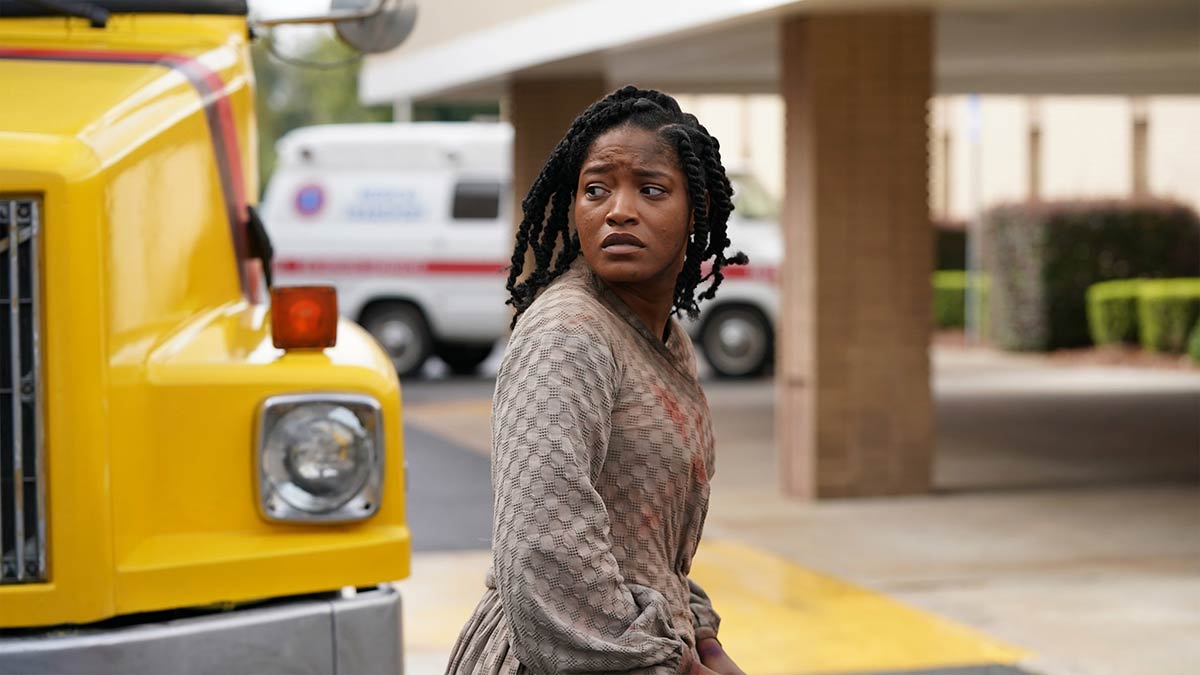Up until the 1960s, Black folks, hoodwinked by sinister white folks, were entrapped into servitude because of debts that they owed. Southern whites took advantage of the climate of racism that dominated the area, and the inherent power dynamics such a system provided, to maintain a form of slavery over a century after its formal abolishment. “Alice,” the stylish, though dull, debut from Krystin Ver Linden, uses those real-life tales as a jumping off point for the director’s own Blaxploitation adventure.
READ MORE: Sundance 2022 Preview: 20 Must-See Movies From The Festival
The titular Alice (Keke Palmer) lives on a Georgia plantation belonging to the malicious Paul Bennet (Johnny Lee Miller). Alice is an enslaved domestic married to another enslaved man, Joseph (Sinqua Walls), until, as they say in their vows, “distance do you part.” Alice knows how to read. But neither her literacy nor her husband can protect her from the vicious Paul. She’s subjected to rape, while the other enslaved Black folks endure brutal beatings. Linden and her cinematographer, Alex Disenhof (“Watchmen”), are careful not to show any traumatic scenes, instead framing the camera above Paul as he inflicts ruthless blows, or leveraging a deep depth of field to show the slain body of a Black man in the background, just out of focus.
Alice believes there’s a better world, a kinder world, waiting for her beyond the forest of leaning, wispy oak trees that surrounds the plantation. The audience, unfortunately, is made to wait for what feels like an interminable amount of time before she attempts an escape. In the meantime, a woozy, bluesy score infused with otherworldly horns wafts over the southern air. The enslaved have all heard stories of slave catchers, which effectively keeps their desires to run at bay. But another legend says that Joseph’s grandfather, years ago, saw a man, with the ability to create fire from his hand, fall from the sky. Alice also hears an anachronistic sound — though she doesn’t know what it is — emanating from the room of Paul’s sullen son: a radio searching for a station.
The film’s first third on the plantation moves at a sluggish pace. If you end up seeing a trailer, or any publicity material, for “Alice,” you’ll know that the title character eventually escapes the plantation, in a twist similar to that of “Antebellum” (though “Alice” isn’t nearly as problematic in its execution). But while Alice’s escape is important, the journey to get there should be, too. Unfortunately, Linden’s underwhelming script bobs along on the surface, never fully emotionally investing us in these characters. Rather she portrays them as enigmas trapped in amber.
Without spoiling how, Alice does eventually make a dash through the woods and comes across an interstate, where she faints before a semi-truck driven by Frank (Common). A once-passionate revolutionary, Frank now works for his Republican, xenophobic brother’s grape farm. He believes Alice might have amnesia and takes her to his home, where she discovers the truth: that it’s 1973, slavery ended over 100 years ago, and Black folks have been fighting for total liberation.
Unfortunately, Palmer and Common don’t possess a modicum of chemistry. The former, through a combination of her fixed, determined eyes and the character’s festering emotional wounds, gives more poignancy to these scenes. On the other hand, Common offers very little. The actor/rapper has never possessed an emotive face, and it’s never been as glaringly obvious as it is here. In one scene, after the pair watch “Coffy” in a theater, an argument ensues, but the rapper struggles to exhibit any semblance of emotion beyond aggressively shrugging his shoulders. But it’s not all Common’s fault. His part, in relation to Keke’s Alice, is ill-defined by Linden’s script.
Throughout “Alice,” Linden gestures toward Blaxploitation influences: schlocky humor pervades, and after discovering the truth, Alice cuts off her braids, puffs her hair into an afro (a la Pam Grier) and becomes desperately determined to burn down the white power structure. Along the way, editor Byron Smith fashions a montage of Malcolm X, Fred Hampton and Angela Davis speeches. Sharp needle drops of music from Diana Ross & the Supremes, Willie Hutch, Stevie Wonder and more give the scenes some added spark. And the precise period production design, 1970s pastels and all, skillfully encapsulates the era.
But the big climactic conclusion Linden aims for doesn’t materialize. An assistant to Quentin Tarantino on “Inglorious Basterds” and “Django Unchained,” Linden somewhat borrows from the latter film in “Alice,” whereby the title character discovers some catharsis by returning to her former plantation. Similar to the opening, however, the intended poignancy simply doesn’t rise to the surface. Linden just didn’t do enough to sketch out these characters, and the fact that she never checks in on the enslaved left behind while Alice is away undercuts any headway she made in developing them in the film’s first few minutes.
Linden offers a fascinating premise, but her visual language doesn’t catch the eye, and the potential excitement to be mined from translating Blaxploitation motifs for modern-day audiences is missing. “Alice” could’ve been so much more, but instead, it comes off like a lost opportunity. [C]
Follow along with all our coverage of the 2022 Sundance Film Festival.





